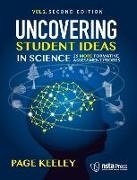Ulteriori informazioni
"Leave no alternative science idea unchallenged!" could be the slogan of this second edition of Uncovering Student Ideas in Science, Volume 2. Like the others in the bestselling series, this book is loaded with classroom-friendly features to pinpoint what your students know (or think they know) so you can adjust your teaching accordingly.
At the book's heart are 25 "probes" to use before you start a topic or unit. These short, easily administered formative assessments will determine your students' thinking on core science concepts in physical science, life science, and Earth and space science. Each section includes a matrix of key concepts and the suggested grade level for each probe. In this new second edition, the probes appear in both English and Spanish. In addition, each probe links to related disciplinary core ideas from A Framework for K-12 Science Education and the Next Generation Science Standards.
The teacher-friendly features are updated too. The accompanying Teacher Notes sections include current research summaries, revised instructional suggestions, and new NSTA resources. As before, these teacher materials also explain science content, present developmental considerations, and suggest instructional approaches for elementary, middle, and high school students.
Other books discuss students' general misconceptions. Only this one provides reproducible pages you can use to challenge student thinking on everything from characteristic properties of matter to habitat change to objects in the sky. Each probe-field-tested across multiple grade levels-can be used at any point in an instructional cycle to help your students reveal, re-examine, and further develop their understanding of science concepts. Rather than assessments of learning, think of these probes as assessments for learning.
Info autore
Page Keeley is an internationally known leader in science education. She is the developer and primary author of the award-winning Uncovering Student Ideas in Science series and the Formative Assessment- Practical Strategies Linking Assessment, Instruction, and Learning series (the "FACTs books"). Her interest in teaching for conceptual understanding and understanding students' thinking began in 1992 after reading the seminal article, Teaching for Conceptual Change- Confronting Children's Experience by Bruce Watson and Dick Konicek. Her very first assessment probe, The Mitten Problem, was based on that article. Her assessment probes and FACTs (formative assessment classroom techniques) are widely used by K-12 teachers, university professors, professional developers, and science specialists throughout the U.S. and internationally.
Riassunto
‘Leave no alternative science idea unchallenged!’ could be the slogan of this second edition of Uncovering Student Ideas in Science. Like the others in the bestselling series, this book is loaded with classroom-friendly features to pinpoint what your students know (or think they know) so you can adjust your teaching accordingly.

